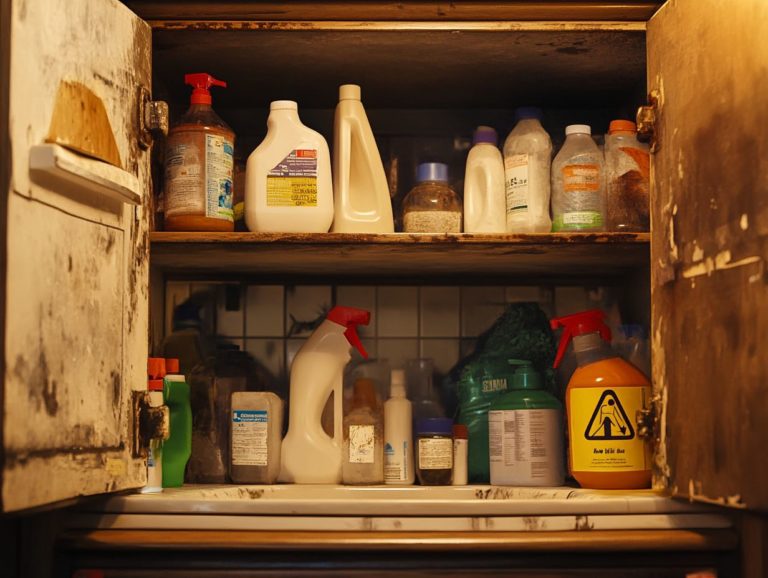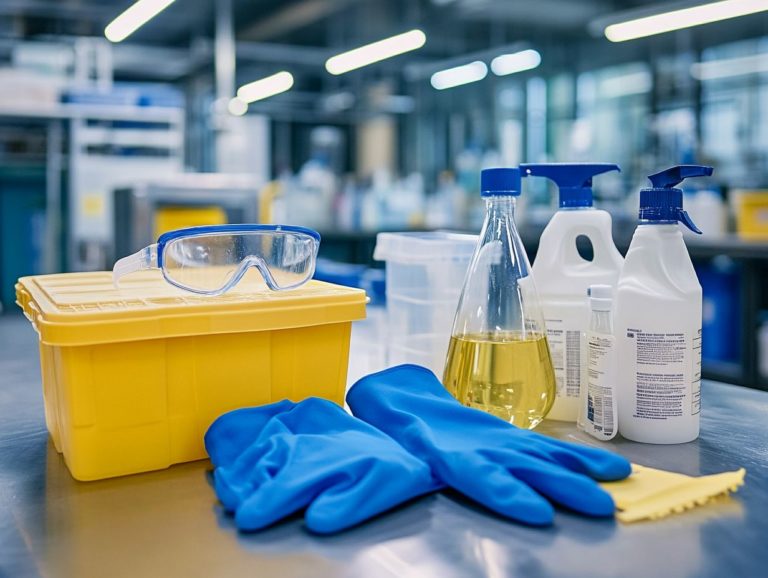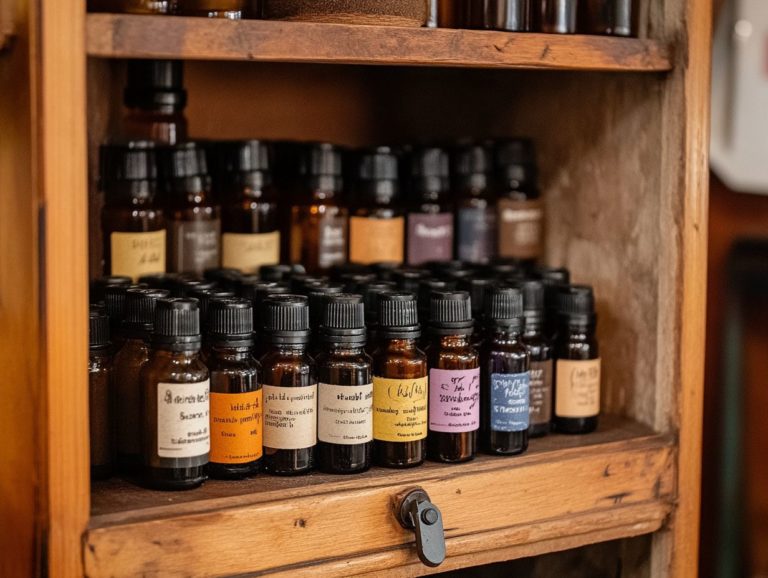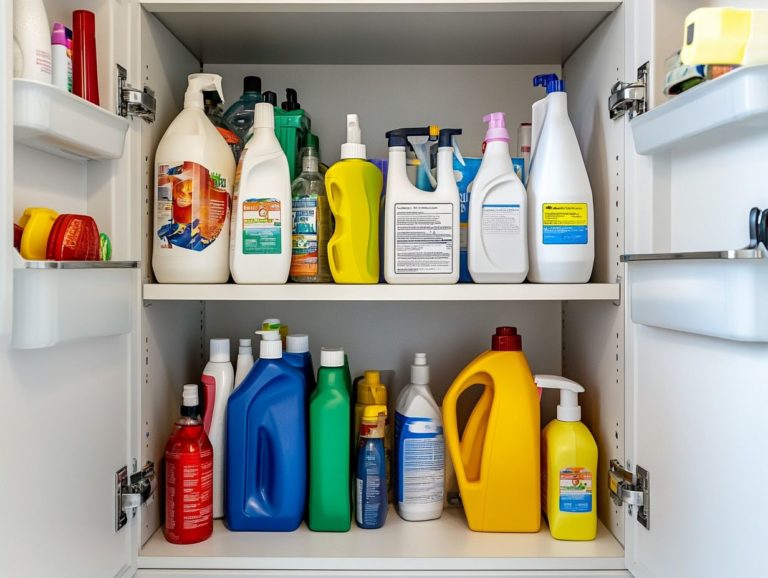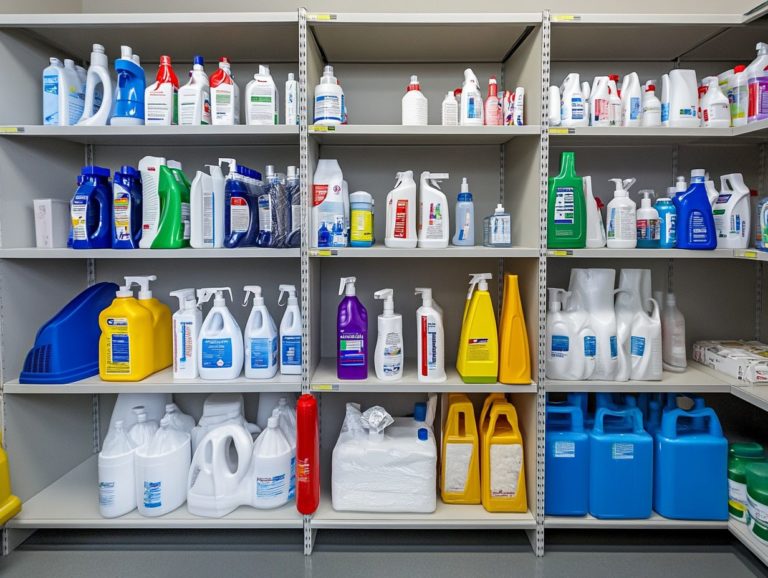Essential Oils: How to Store Them Safely
Essential oils have become quite the sensation, celebrated for their wide-ranging benefits from uplifting your mood through the art of aromatherapy to acting as natural remedies for those pesky everyday ailments. These natural oils, derived from pure plant extracts, offer a myriad of applications for home use, including homemade soap and natural cleaning solutions.
To truly savor their advantages and prolong their lifespan, it s crucial to grasp the nuances of proper storage. This guide delves into the perks of essential oils, provides practical storage tips, highlights the signs of spoilage, and offers a comprehensive overview of their shelf life.
Discover how to unlock the full potential of these aromatic treasures today, ensuring their longevity and high quality through proper storage conditions!
Contents
Key Takeaways:
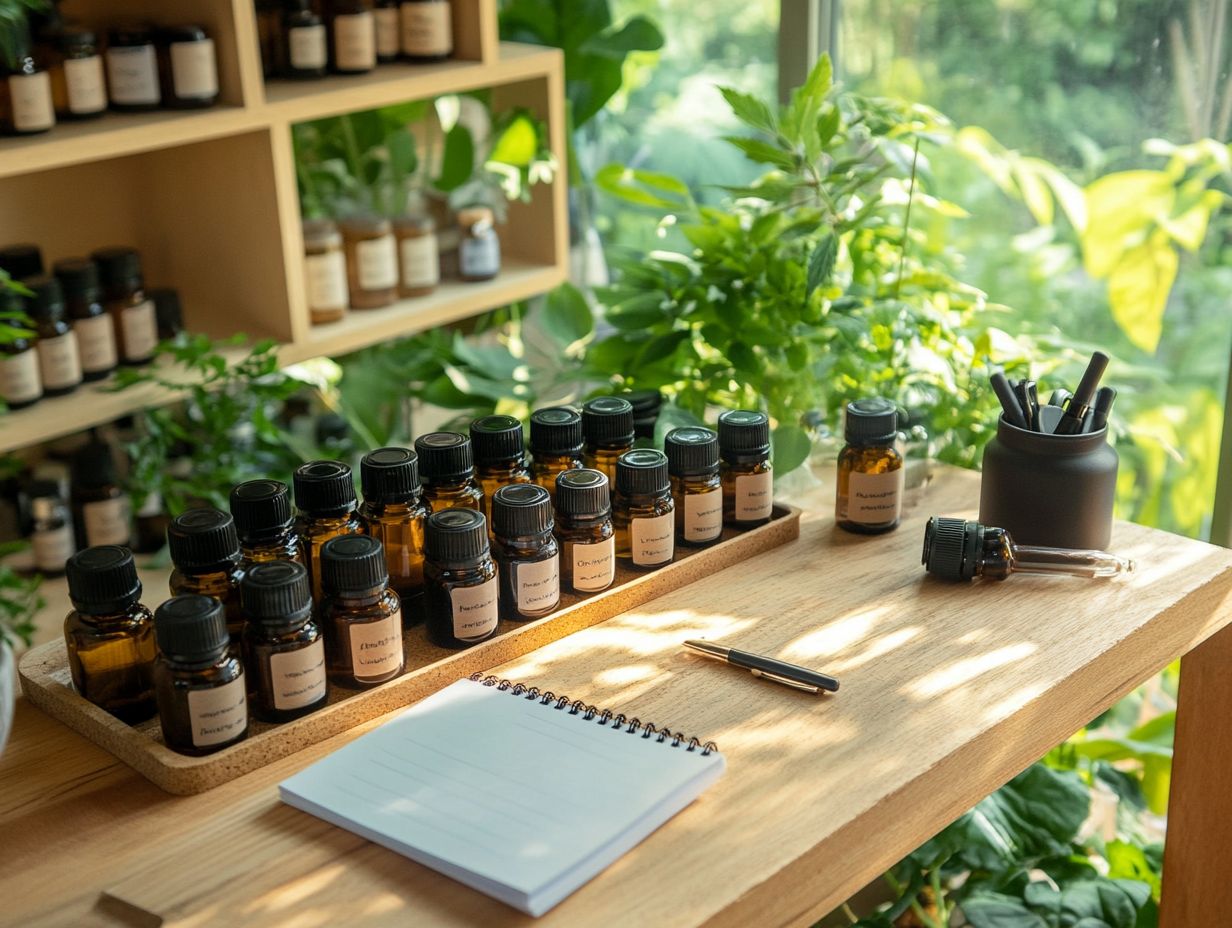
- Store essential oils in dark glass bottles, such as amber or cobalt-blue, in a cool, dry place away from sunlight and heat to prolong their shelf life and maintain potency.
- Always label and date your oils to track expiration and monitor deterioration, avoiding spoiled oils that can cause skin irritation or allergic reactions.
- The shelf life of essential oils varies: citrus oils last 1-2 years, floral oils last 2-3 years, and woody, herbal, and spicy oils last 4-6 years. Proper packaging and storage can enhance longevity.
What Are the Benefits of Essential Oils?
Essential oils come from the extracts of plants. They offer numerous benefits that enhance your well-being and create a healthier environment.
These concentrated natural oils are rich in therapeutic properties. They re perfect for various applications, such as the enchanting practice of aromatherapy, which uses aromatic compounds for emotional and physical healing. Using carrier oils like avocado or jojoba oil makes essential oils more effective and safer.
Furthermore, essential oils can serve as effective natural remedies for various ailments, offering you splendid alternatives to over-the-counter medications. They also act as powerful allies in household cleaning, enabling you to purify your living space naturally while indulging in their delightful scents.
The versatility of essential oils truly makes them a valuable addition to your daily routine, providing benefits in both health and household cleaning.
1. Aromatherapy
Aromatherapy is a natural method that uses essential oils to improve your mood and health. It harnesses the power of essential oils to elevate both your physical and emotional well-being, seamlessly integrating the therapeutic properties of nature into your daily life. Essential oil integration into your routine can be achieved through various methods, including diffusers and DIY products like air fresheners and homemade soap.
This timeless practice draws upon centuries of tradition, using the fragrant essences extracted from plants, flowers, and herbs. Consider the calming effect of Lavender, or the invigorating refreshment of Peppermint both of which can effortlessly enhance your everyday experiences. Essential oil applications can range from personal care to creating a serene home environment.
For instance, adding Lavender oil to your diffuser during meditation can foster a profound sense of tranquility, while Peppermint oil can transform a homemade air freshener into a powerful tool for boosting focus and energy.
When used with care such as diluting oils before applying them to your skin and steering clear of ingestion these essential oils can not only elevate your mood but also offer a wealth of health benefits, including improved sleep and reduced stress. Regular consultation with a healthcare professional can help maximize these therapeutic benefits.
2. Natural Remedies for Ailments
Essential oils offer a rich variety of natural remedies that can help relieve various ailments, using the healing power of plant extracts to enhance your health and wellness. Consulting experts like Robert Tisserand provides deeper insights into safe and effective usage.
For instance, lavender oil is great for easing tension headaches, while eucalyptus oil is a fantastic aid for clearing congestion during a cold. Tea tree oil is your go-to for treating skin irritations due to its well-known antibacterial properties.
Remember, “natural” does not always mean “safe.” Consulting a healthcare professional is crucial, especially for persistent or serious health issues.
When using essential oils, always dilute them with a carrier oil, such as coconut or jojoba oil. This step helps minimize the risk of irritations or allergic reactions, making your experience safe and effective.
3. Household Cleaning
Using essential oils in your cleaning routine provides an eco-friendly approach that purifies the air and creates a fresh, safe environment free from harsh chemicals. Choosing natural cleaning solutions with essential oils can be a safer alternative to commercial products.
By incorporating these aromatic natural remedies, you can tap into their powerful antibacterial and antifungal properties, making them effective substitutes for many commercial cleaners. For example, using Tea Tree oil in a homemade spray not only smells delightful but also effectively fights unwanted bacteria on surfaces.
Lemon oil adds a refreshing fragrance, and its citric acid content helps break down grease and grime. Always consider proper use of carrier oils and dilution ratios for safety when handling essential oils.
When making these cleaning solutions, store essential oils in dark glass bottles to protect them from light degradation and preserve their potency. Label your mixtures clearly to avoid misuse and ensure safe application.
How to Store Essential Oils Safely?
Proper storage of essential oils is vital for maintaining their purity and effectiveness. When not stored correctly, essential oils can degrade, compromising their integrity and diminishing their therapeutic properties. Use suitable packaging materials and follow safety guidelines to keep your oils fresh.
This careful attention not only extends the lifespan of the oils but also ensures that you are harnessing their full benefits every time you use them.
1. Keep Out of Reach of Children and Pets
To keep essential oils safe in your home, store them out of reach of children and pets to prevent accidental ingestion or exposure to harmful substances. Always purchase essential oils from reputable sources to ensure quality and safety.
In addition to careful storage, clearly label all storage areas so you can quickly identify which oils are safe for use and which are not. Make it a practice to dilute essential oils before applying them to the skin to significantly lower the risk of irritation or allergic reactions.
You need to know that many essential oils are flammable; they should never be used near open flames or excessive heat sources. By educating your family about these risks and ensuring proper containment, you can create a much safer environment for everyone, including your beloved furry companions.
2. Store in Dark Glass Bottles
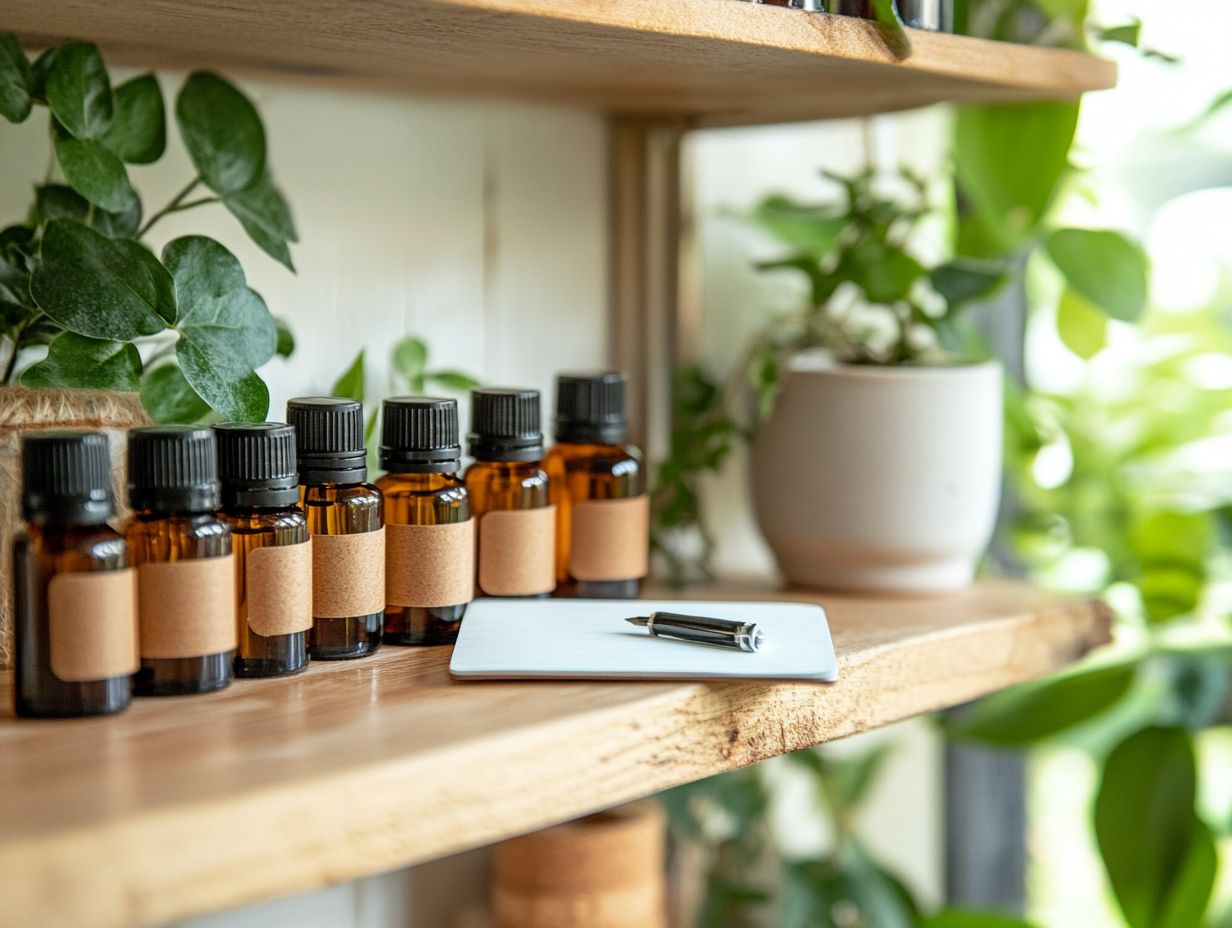
Using dark glass bottles, such as amber or cobalt-blue glass, to store your essential oils is crucial for protecting them from UV light. UV light can speed up the oxidation process and diminish their quality and effectiveness.
Opt for bottles made from amber or cobalt blue glass. They block harmful rays and allow you to easily check the oil s contents. This choice significantly prolongs the lifespan of your essential oils, ensuring they retain their therapeutic properties and delightful aromas.
Practice proper sealing techniques. Make sure the caps are tightly secured after each use to limit air exposure, as oxygen can also contribute to degradation. Store these bottles in a cool, dark, and dry place to enhance their longevity and preserve the integrity and potency of the oils inside.
3. Keep in a Cool, Dry Place
Storing essential oils in a cool, dry place is essential for preserving their freshness and preventing premature degradation. This degradation can negatively affect both their aromatic and therapeutic properties.
Regularly monitor the storage conditions to maintain essential oil integrity. Maintaining the right temperature and humidity levels is crucial. Excessive heat can lead to oxidation, diminishing the oils’ potency, while high humidity may invite mold growth or other unwanted microbial activity.
Keep your essential oils at temperatures between 60 F and 75 F, with relative humidity hovering around 40% to 60%.
For the best longevity, use dark glass bottles to shield the oils from light. Store them in cabinets away from heating appliances or direct sunlight.
Consider using climate-controlled storage options, such as climate-controlled basements or closets. This can effectively minimize fluctuations and ensure that your essential oils retain their beneficial qualities for as long as possible.
4. Avoid Sunlight and Heat
To preserve the integrity of your essential oils, avoid direct sunlight and heat sources. These conditions can lead to oil degradation, ultimately reducing their efficacy.
When exposed to sunlight and excessive heat, ultraviolet rays and high temperatures can instigate oxidation, altering the chemical composition of the oils. This not only makes them less effective but may also render them potentially harmful.
Such degradation undermines the therapeutic benefits you seek from these natural extracts. It may even result in unwanted fragrances or irritants.
To safeguard your essential oils effectively, choose dark, cool storage spaces, like a cabinet or drawer, ideally with temperature regulation. Using amber or cobalt glass bottles offers an additional layer of protection from light.
5. Label and Date Your Oils
Start labeling and dating your essential oils today! This simple step keeps your collection fresh and organized.
By adopting this practice, you maintain the integrity of your oils and cultivate a more organized approach to your aromatherapy and wellness routines.
Assign clear labels that include both the purchase and expiration dates. This allows you to effortlessly keep tabs on what needs to be used up soon.
Consider grouping your oils by type or purpose whether calming, energizing, or medicinal to streamline your application process. Using transparent containers or a dedicated shelf enhances visibility, while color-coding your labels adds a delightful, aesthetic touch to your organization system.
Regularly review your collection to foster mindfulness and ensure that nothing goes to waste.
What Are the Signs of Spoiled Essential Oils?
Recognizing the signs of spoiled essential oils is crucial for ensuring their safe and effective use. Using oils that have expired or degraded can diminish their therapeutic benefits and lead to potential skin irritation.
Keep an eye on the quality of your essential oils to enjoy their full benefits.
1. Changes in Color or Consistency
One of the first signs that your essential oils may have spoiled is a noticeable change in color or consistency. This indicates that their freshness and integrity have been compromised.
You might notice a deepening of color, like a bright lavender oil turning to a darker hue. You may also observe a shift in consistency from a thin liquid to a more viscous texture. This hints that a process where oils break down over time, known as oxidation, has taken place.
Such changes can significantly impair the oils’ usability, affecting not only their aromatic properties but also their therapeutic benefits.
For instance, citrus oils like lemon and orange are particularly prone to spoilage. If you observe a cloudy appearance or separation, it’s a clear indication that it’s time to let them go.
Carrier oils like jojoba can also thicken or become rancid, reducing their effectiveness when blending with essential oils.
2. Unpleasant Smell
An unpleasant smell or rancid odor is a clear sign that your essential oils have seen better days. This indicates a significant decline in their quality and therapeutic benefits.
When essential oils spoil, their scent can shift dramatically. It often turns sharp, sour, or even burnt instead of retaining that expected fresh and fragrant profile. This transformation not only signals that the oils have aged beyond their prime but also raises concerns about their effectiveness and even worse, their potential to cause harm.
If you encounter such a scent, it s crucial to discard the oil immediately. Lingering rancid oils can disrupt your environment and wellness routines. Always check expiration dates and ensure your oils are stored properly to extend their lifespan and preserve their aromatic qualities.
3. Skin Irritation or Allergic Reactions
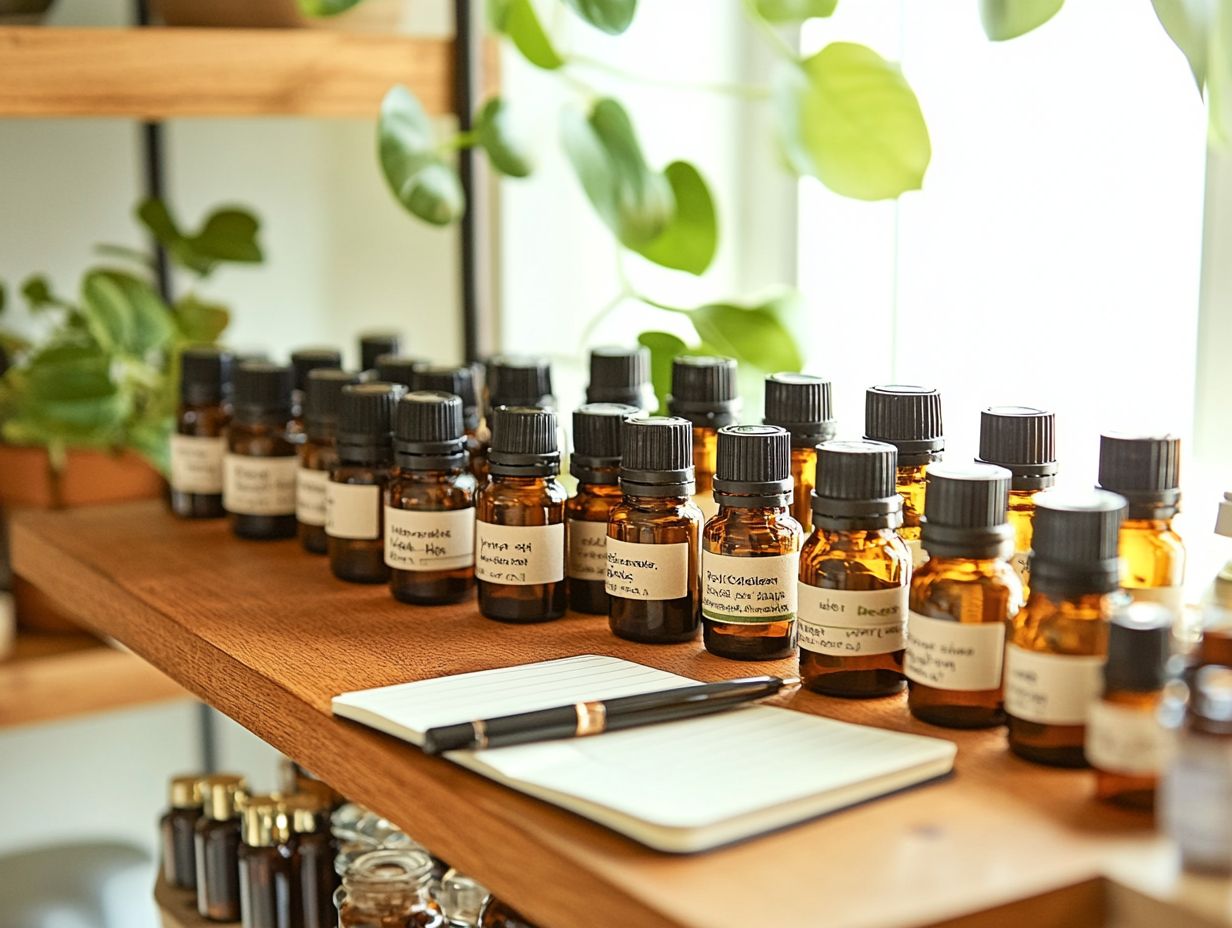
Experiencing skin irritation or allergic reactions when using essential oils can indicate that the oil may have spoiled or that it was not handled or diluted correctly.
Recognizing the early signs of these reactions is critical for maintaining your skin health. Be vigilant for symptoms such as redness, itching, or swelling, as these could signify a negative response to the essential oil.
Proper handling and dilution are essential steps to minimize risks. Always mix essential oils with a carrier oil, which is used to dilute essential oils before applying them to your skin to prevent irritation.
If you experience any discomfort, it s crucial to discontinue use immediately and cleanse the affected area with gentle soap and water. Should the irritation persist or worsen, don t hesitate to seek guidance from a medical professional to ensure you receive safe and appropriate treatment.
How Long Do Essential Oils Last?
The shelf life of essential oils can vary greatly depending on their specific type and the conditions in which they are stored. This variability plays a crucial role in determining both their longevity and effectiveness for your home use.
1. Citrus Oils (1-2 years)
Citrus oils, celebrated for their invigorating and uplifting fragrances, typically boast a shelf life of 1 to 2 years. This positions them among the more short-lived essential oils.
This relatively brief lifespan can be traced to factors such as oxidation, along with their pronounced sensitivity to air, light, and heat. When stored improperly, these oils can experience oxidative degradation, which not only weakens their delightful aroma but also alters their therapeutic benefits.
To extend the life of your citrus oils, it’s crucial to store them in dark glass bottles, nestled in a cool, dry location, away from direct sunlight. Ensuring that the bottle is tightly sealed will minimize air exposure, helping to maintain the oil’s freshness and effectiveness for as long as possible.
Take a moment to check your essential oils today, and ensure they are still safe to use!
2. Floral Oils (2-3 years)
Floral oils typically boast a shelf life of 2-3 years, presenting a captivating array of scents while retaining their therapeutic properties throughout this duration.
To fully appreciate floral oils like Lavender and Bergamot, you must prioritize proper storage. Keep them in a cool, dark environment, safely tucked away from direct sunlight and heat. Glass containers are ideal, as they protect the oils from potential contaminants that could diminish their quality.
Opt for airtight seals to extend their lifespan, as this helps prevent oxidation and the loss of delightful aromatic compounds. It’s also prudent to regularly check for any changes in scent or consistency, as these can signal a decline in quality. This way, you can savor your favorite floral oils at their finest for as long as possible.
3. Woody Oils (4-6 years)
Woody oils, such as the renowned Sandalwood and Patchouli, typically boast a shelf life of 4 to 6 years, positioning them among the most enduring essential oils available.
Their remarkable longevity stems from the heavier compounds they contain, which are less volatile compared to those found in lighter essential oils. This distinctive feature not only helps woody oils maintain their captivating aromas for extended periods but also amplifies their therapeutic benefits.
To preserve these valuable oils, proper storage is essential. It is crucial to keep them shielded from sunlight and heat, ideally in dark glass containers at stable, cool temperatures. Ensure to seal the bottles tightly after each use to minimize air exposure and prevent oxidation. Regularly check for any changes in color or scent to maintain the integrity of these oils over time.
4. Herbal Oils (4-6 years)
Herbal oils stand out with remarkable longevity, typically lasting between 4 to 6 years when stored properly. This extended shelf life allows you to enjoy their amazing benefits across various applications for much longer than many conventional oils, which often have shorter shelf lives and degrade more quickly.
The impressive quality retention of herbal oils is due to their natural composition and the absence of synthetic additives, which can lead to rancidity. Take Eucalyptus oil, for instance it’s not just loved for its invigorating aroma and medicinal properties; it remains effective over time, making it a go-to for aromatherapy, respiratory support, and even natural insect repellents.
These unique qualities not only ensure a prolonged usability span but also preserve the therapeutic benefits of the oils, making them an excellent choice for your personal care and wellness needs.
5. Spicy Oils (4-6 years)
Spicy oils like Clove and Ginger are not just about their rich aromas; they offer a wealth of therapeutic benefits and have a remarkable shelf life of 4-6 years, making them incredibly versatile for various applications.
These oils enhance the flavors of countless dishes while also boasting impressive anti-inflammatory and antioxidant properties, making them invaluable in both your culinary endeavors and wellness routines. When you incorporate them into your cooking, even the simplest meals can transform into complex, flavorful experiences. In therapeutic contexts, they serve as a path to relaxation and overall well-being.
To truly harness their potent qualities, proper storage is key. By keeping these oils in a cool, dark place away from direct sunlight and extreme temperatures, you can significantly extend their shelf life. This ensures that their robust flavors and health benefits remain intact for as long as possible, allowing you to enjoy their full potential.
Frequently Asked Questions
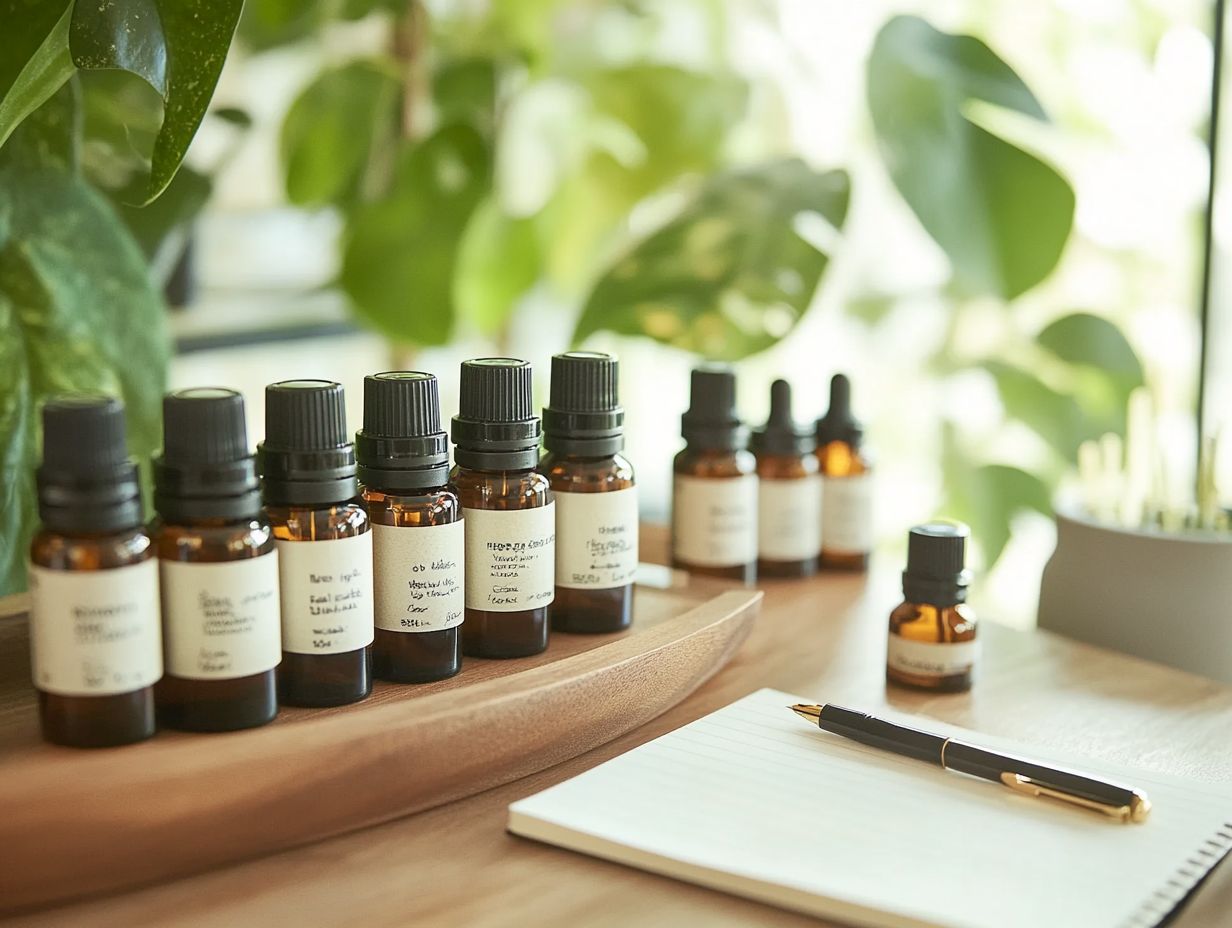
How should I store my essential oils to keep them safe?
Essential oils should be stored in a cool, dark place away from direct sunlight and heat sources to maintain their quality and therapeutic properties. A cabinet or drawer is a good option for storage tips.
Discover more ways to enjoy your essential oils today!
What containers are best for storing pure essential oils?
Dark glass bottles, such as amber or cobalt-blue, are ideal for storing essential oils. They protect the oils from UV light and preserve their aromatic compounds.
Can essential oils be stored in plastic containers?
No, plastic containers are not suitable for essential oils. The oils can break down the plastic, leading to contamination and compromised integrity.
Should I refrigerate my essential oils?
No need to refrigerate essential oils! Fluctuating temperature and humidity in fridges can harm the oils. Store them in a cool, dark place instead.
What is the shelf life of essential oils?
The shelf life varies by type, but most essential oils last for 1-2 years if stored properly. Citrus oils have a shorter shelf life, while others with compounds like phenols can last longer.
Can I store all my essential oils together?
It’s best to store essential oils separately. Some oils can react with each other, changing their properties and reducing their benefits. Label and store each oil individually!

